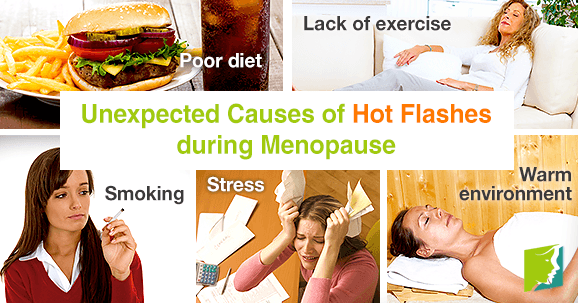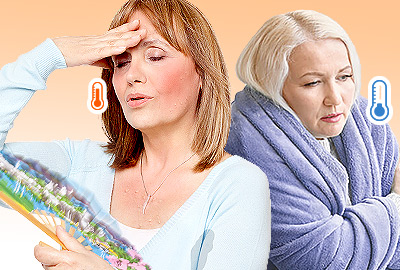Hot flashes are defined as a sudden burst of intense heat, often starting in the face or chest, and spreading quickly across the rest of the body. They are one of the most common symptoms of menopause: more than 75% of women between the ages of 44 - 55 experience hot flashes, and of these, 85% experience them more than once a year. Flashes are uncomfortable and can seem unpredictable, so it's helpful to know what causes them in order to understand and avoid the symptom's triggers.
The Principal Cause: Hormonal Imbalance
The most significant cause is hormonal imbalance during menopause. Lack of estrogen causes the hypothalamus (which regulates body temperature) to falsely detect an increase of temperature in the body, which then reacts to cool down. To regain a normal body temperature, blood vessels near the skin's surface dilate, and the skin flushes, radiates heat, and exudes sweat.
Unexpected Causes of Hot Flashes
Though preventing this imbalance is difficult, there are some unexpected causes that you can address to help limit the frequency and intensity of hot flashes:
Poor diet
An excess of processed or refined foods in the diet will have a detrimental effect on the way the body functions. Nuts, grains, and beans have been proven to help facilitate normal activity in the hypothalamus, so replacing junk food in your diet with these could decrease the occurrence of hot flashes. Eating spicy food can also provoke an increase in your body temperature and trigger a hot flash.
Lack of exercise
Similarly, regular exercise has a significant effect on the way the body functions. Exercise 30 minutes a day, five days a week. As well as decreasing the likelihood of recurrent hot flashes, exercise could address other symptoms of menopause, such as weight gain and mood swings.
Smoking
Smoking causes blood vessels to lose some of their ability to radiate heat, which is likely to make hot flashes more intense. Quitting smoking could make your hot flashes significantly milder.
Stress
A survey taken in 2010 found stress to be one of the most common triggers for experiencing regular hot flashes between the ages of 44 - 55. It is worth reassessing your routine if you regularly feel stressed, as this may be triggering hot flashes, as well as impacting your sense of well-being and overall health. Exercising regularly can also provide a distracting antidote to stress. If you are concerned that stress is affecting your quality of life, it is advisable to make an appointment to consult your doctor.
Warm environments
Environments such as saunas, hot rooms, hot tubs, hot baths, and showers can trigger hot flushes. If you are going to be in these environments, it may be useful to situate yourself close to the exit so you can easily leave to cool down, or bring something to help you cool down, such as cold water or a fan.
Though hormonal imbalances mean that hot flashes are sometimes unavoidable, understanding other triggers can help you prepare for them, so you can make adjustments to your lifestyle where possible to alleviate the flashes intensity and frequency.
Sources
- BreastCancer.org. (2013). All About Hot Flashes. Retrieved January 13, 2014, from http://www.breastcancer.org/tips/menopausal/facing/hot_flashes
- National Health Service UK. (2012). Symptoms of the menopause. Retrieved January 13, 2014, from http://www.nhs.uk/conditions/menopause/pages/symptoms.aspx
- The North American Menopause Society. (2012). Treating hot flashes. Retrieved January 13, 2014, from http://www.menopause.org/docs/for-women/mnflashes.pdf




